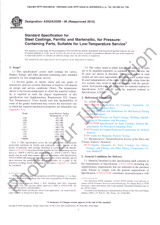Wir benötigen Ihre Einwilligung zur Verwendung der einzelnen Daten, damit Sie unter anderem Informationen zu Ihren Interessen einsehen können. Klicken Sie auf "OK", um Ihre Zustimmung zu erteilen.
ASTM D3559-15
Standard Test Methods for Lead in Water (Withdrawn 2024)
Automatische name übersetzung:
Standard-Testverfahren für Blei im Wasser
NORM herausgegeben am 1.6.2015
Informationen über die Norm:
Bezeichnung normen: ASTM D3559-15
Anmerkung: UNGÜLTIG
Ausgabedatum normen: 1.6.2015
SKU: NS-623560
Zahl der Seiten: 19
Gewicht ca.: 57 g (0.13 Pfund)
Land: Amerikanische technische Norm
Kategorie: Technische Normen ASTM
Kategorie - ähnliche Normen:
Die Annotation des Normtextes ASTM D3559-15 :
Keywords:
atomic absorption, chelation-extraction, graphite furnace spectrophotometry, lead, voltammetry,, ICS Number Code 13.060.50 (Examination of water for chemical substances)
Ergänzende Informationen
| Significance and Use | ||||||||||||||||||||||||||||||||||||||||
|
4.1 The test for lead is necessary because it is a toxicant and because there is a limit specified for lead in potable water in the National Interim Primary Drinking Water Regulations. This test serves to determine whether the lead content of potable water is above or below the acceptable limit. |
||||||||||||||||||||||||||||||||||||||||
| 1. Scope | ||||||||||||||||||||||||||||||||||||||||
|
1.1 These test methods cover the determination of dissolved and total recoverable lead in water and waste water by atomic-absorption spectrophotometry2 and differential pulse anodic stripping voltammetry. Four test methods are included as follows:
1.2 Test Method B can be used to determine lead in brines. Test Method D has been used successfully with reagent water, lake water, well water, filtered tap water, condensate from a medium Btu coal gasification process, waste treatment plant effluent, and a production plant process water. 1.3 It is the user's responsibility to ensure the validity of these test methods for waters of untested matrices. 1.4 The values stated in SI units are to be regarded as standard. The values given in parentheses are mathematical conversions to inch-pound units that are provided for information only and are not considered standard. 1.5 This standard does not purport to address all of the safety concerns, if any, associated with its use. It is the responsibility of the user of this standard to establish appropriate safety and health practices and determine the applicability of regulatory limitations prior to use. For specific hazards statements, see Note 3, 11.3, 11.4, 11.8.1, 21.8, 21.9, 21.12, 23.7, 23.10, 32.2.1, and 33.1. |
||||||||||||||||||||||||||||||||||||||||
| 2. Referenced Documents | ||||||||||||||||||||||||||||||||||||||||
|
Empfehlungen:
Aktualisierung der technischen Normen
Wollen Sie sich sicher sein, dass Sie nur die gültigen technischen Normen verwenden?
Wir bieten Ihnen eine Lösung, die Ihnen eine Monatsübersicht über die Aktualität der von Ihnen angewandten Normen sicher stellt.
Brauchen Sie mehr Informationen? Sehen Sie sich diese Seite an.




 Cookies
Cookies
